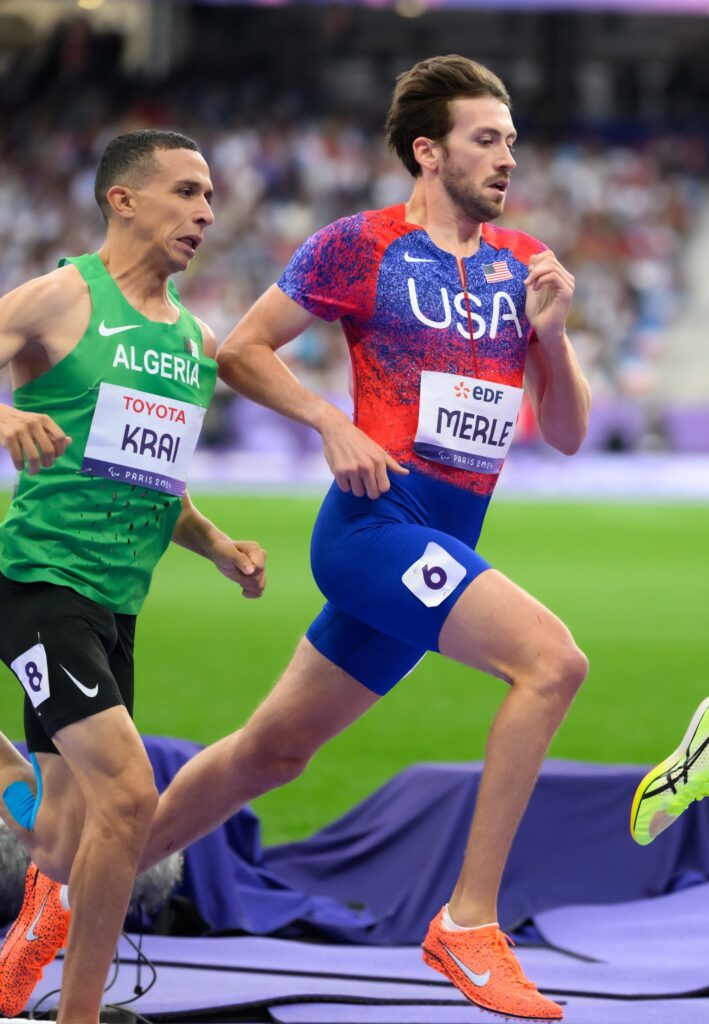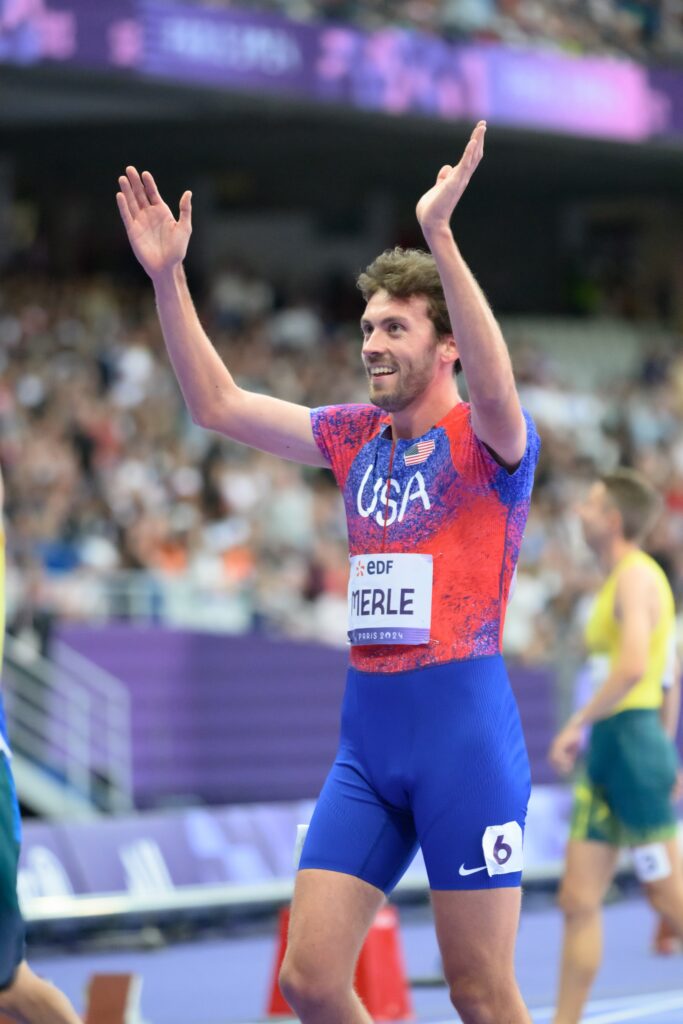For 2024 U-M dentistry grad Leo Merle, competing in the Paris Paralympics was rewarding and inspiring in many ways10 min read
Ann Arbor, Mich., Sept. 18, 2024 – There was no denying the broad smile that came across Leo Merle’s face as he looked up into the massive stadium crowd after he crossed the finish line of the 1,500-meter run at the Paralympics in Paris on Sept. 7.
He had finished in sixth place, three seconds behind the bronze medal winner, so there would be no medal for his effort. Yet, as he looked up at his parents in the cheering crowd at Stade de France, he couldn’t help but be thrilled with the journey that brought him to Paris to compete against some of the best athletes from around the world.

“When I finished, my immediate thought was, ‘That was just incredible.’ It was the most incredible feeling I’ve ever experienced in my life,” Merle said. “It would be really fantastic to win a medal. Absolutely. But for me, it was a more wholistic experience. I was so happy with how my training had gone. I was happy with where we were at coming into the games and what I was able to do on the track that night. We did a lot of experimenting and testing to see where my top-end speed was. And we predicted it perfectly. So I knew that was the fastest I could go in that moment, so I went for it. Of course I would love to get a medal, but I know there are just so many great runners in that race.”
Becoming a member of the U.S. Paralympics Track and Field Team for the 2024 Paralympics in Paris was the culmination of several years of competing in national and international para athletics events. Training to be a world-class runner is strenuous enough on its own, but Merle was doing it over the last four years while attending the University of Michigan School of Dentistry. He graduated with his DDS degree in May but had paused his search for a dentistry job because of his commitment to competing in Paris.
Merle qualifies for para athletic competitions because he was born with a form of cerebral palsy that affects flexibility in his right foot and leg. From the time he was a baby until he was six years old, he wore a corrective boot designed to stretch the tendons of his right leg so they would develop properly and maintain their flexibility. To stay active, he participated in athletics as a child and was an average runner on his high school track team in his hometown of Folsom, California, and on the track team at the University of California-Santa Cruz. He didn’t discover para athletics until his junior year of college. He learned that the international para athletic movement has a wide range of categories for athletes with physical limitations, including those with cerebral palsy. Merle competes in the T-38 class, which is for athletes whose movement and coordination is affected to a low degree in their lower trunk and legs, either down one side or the whole body.
Para athletics has grown in widespread recognition in recent years thanks in large part to television coverage of the Paralympics that now immediately follow the Olympic Games every four years. The most prominent para athletes are those who compete in wheelchairs or amputees who run with prosthetic “blades” for sprints and longer races. However, para athletics offers many categories for athletes with a wide range of disabilities, including those with cerebral palsy, spinal injuries, visual impairments and intellectual disabilities.
Merle traveled to Paris with the U.S. team on Aug. 22, well ahead of his Sept. 7 race, in order to acclimate his body to the time zone change, along with adjusting to a new sleep cycle, different food and the local weather, among other factors. He stayed in the same Olympic Village as athletes who had participated in the Olympics from July 26 through Aug. 11. Merle roomed with U.S. para sprinter Ryan Medrano, who won silver medals in the 100- and 400-meter runs. While he waited for his event, Merle went on training runs throughout Paris with other U.S. team members or alone, passing iconic landmarks like the Eiffel Tower, Notre Dame and the Arc de Triomphe.
Merle said he was not nervous during the day leading up to his 7 p.m. race on Sept. 7. He felt confident and relaxed, though the excitement was inescapable as he and his racemates entered the stadium and the enormous roar of the crowd washed down over them. When Merle was introduced to the crowd and television audience, he played up his newly minted dental degree by wagging a finger across his teeth as though he was brushing his teeth.
The 1,500-meter run is known as the metric mile since it is slightly less than one mile in length and requires running just under four laps of a standard track. Based on his previous experience with the seven other competitors in the race, Merle said his strategy was to position himself closely behind the lead group of runners and wait for the usual sprint to the finish in the last lap or lap and a half. What he didn’t count on was that the leaders would run an extremely slow pace for the first three laps or so.
“It was the slowest I think I have ever experienced,” he said. “Normally the pace is the equivalent of a very low 4-minute mile. When we finished the first lap, it was 5:20 mile pace. For how we usually race, it was very much relaxed. And what comes with relaxation is that everybody gets clumped together super tight in a group because everyone is jockeying for the three medal positions. If you are not up front, you want to be on the inside of the track, just hanging out there, so I put myself in that position. But since we were tightly packed, arms going and legs flying, everyone was running into each other.” Merle was spiked three times by runners in front of him – once on each shin and once on his right thigh.
With about 600 meters left in the race (about a lap and a half), the real race started as the leaders picked up the pace. “lt doesn’t matter what your position is,” Merle said, “it’s ‘Go Time.’ Everyone takes off, boom, out of the gate, flying like a rocket. It’s a total break-neck pace change. It’s the type of racing I love because you are jockeying for position. You fought for your position and you either hold it or you take another one. It’s straight grit going through to the finish.”
Merle knew certain competitors would have slightly better final sprint times than his, and that’s how the finish panned out. Amen Allah Tissaoui of Tunisia edged to the front and won the race less than a second ahead of the second- and third-place finishers. The fourth- and fifth-place runners and Merle in sixth-place were all less than 4 seconds behind the winner, with two other runners trailing the field.
The results:
1. Amen Allah Tissaoui, Tunisia, 4:12.91
2. Nate Riech, Canada, 4:13.12
3. Reece Langdon, Australia, 4:13.13
4. Angus Hincksman, Australia, 4:14.14
5. Abdelkrim Krai, Algeria, 4:16.19
6. Leo Merle, USA, 4:16.43
7. Renaud Clerc, France, 4:20.40
8. Teofilo Freitas, Timor-Leste, 4:30.10
The slow pace in the early stages resulted in finish times that were significantly slower than the runners’ personal bests. Merle was more than 10 seconds behind his personal best of 4:06.30, which was the U.S. para record for part of the last year before another runner eclipsed it. Even the winner, Tissaoui of Tunesia, was more than 14 seconds off his best-ever of 3:58.31.

In the run-up to the Paralympics over the last couple of years, Merle has emphasized that running is an important part of his life, but so is dentistry, family and friends, and other interests. Running helped reduce the stress of dental school, and the demands of dental school helped Merle reduce the stress of the training regime necessary to compete at a world-class level.
He says pursing his Paralympics goal was rewarding in more ways than he can articulate. Among his rewards: Working past a physical limitation by setting an athletic goal, training for it and reaching higher than he ever would have predicted years ago; completing that goal while also completing dental school; representing the United States on the Paralympics team as well as at other national and international meets; hearing the National Anthem played because he won the gold medal at the Parapan American Games in Santiago, Chile, last November; meeting people and making friends from around the world; being at the center of a surreal roaring crowd at the Olympic stadium in Paris.
“I am very aware of how lucky I am and how unique this opportunity absolutely was,” he said. “For me, the satisfaction is knowing that I was able to do the dentistry, I was able to do the running, I was able to do the weight-lifting, the eating, the sleeping, the managing of all my time. And the fact that I was able to perform as well as I did was satisfying for me. Being able to do all of those things in conjunction is what makes it all fantastic.”
Merle is taking a few weeks off from running to allow his body to recover, but soon he will be back on his local running routes. In the meantime, he and members of the U.S. Paralympic team have been invited to visit the White House on Sept. 28, with a media day and other responsibilities during the trip. He also has been invited to an upcoming meeting with the University of California Board of Regents to discuss how that state’s universities can help para athletes succeed at the national and international levels.
Merle will be staying in Ann Arbor and at the U-M School of Dentistry for several more years because he was recently accepted into the three-year Endodontics Graduate Program, beginning in July 2025. Until he starts that program, he is considering a short-term contract in a dental practice.
And there is one more plan he is making: He wants to continue competing in national and international para athletic events in the next several years so that he can make the U.S. team again for the 2028 Paralympics that will be held in Los Angeles. He came to that decision almost immediately at the conclusion of the race in Paris.
“After finishing the race, the amount of excitement and inspiration I felt, my reaction was: ‘I have to go for L.A. I can’t not do it. With what I just experienced, I have got to do it.’ It just felt so amazing.”
###
The University of Michigan School of Dentistry is one of the nation’s leading dental schools engaged in oral healthcare education, research, patient care and community service. General dental care clinics and specialty clinics providing advanced treatment enable the school to offer dental services and programs to patients throughout Michigan. Classroom and clinic instruction prepare future dentists, dental specialists and dental hygienists for practice in private offices, hospitals, academia and public agencies. Research seeks to discover and apply new knowledge that can help patients worldwide. For more information about the School of Dentistry, visit us on the Web at: www.dent.umich.edu. Contact: Lynn Monson, associate director of communications, at [email protected], or (734) 615-1971.
